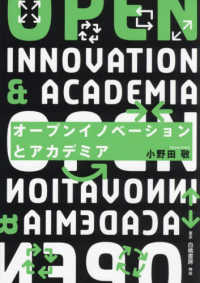- ホーム
- > 洋書
- > 英文書
- > History / World
Full Description
In this study of Japan's imperial historiography in the late nineteenth and early twentieth centuries, Birgit Tremml-Werner examines the use of history to promote expansion in the Asia-Pacific region. Focussing on historian-diplomat Murakami Naojirō, she highlights the impact of the archive and translation in knowledge creation. Combining empirical examples including early modern diplomatic missions to Europe, indigenous Taiwanese history, colonial education and post-war cultural diplomacy, this work emphasizes how the past is represented in the intertwined environments of history and memory. She argues that the Japanese case also reveals wider questions around the myth-making of nation states, and the extent to which 'historiographical violence' has silenced the voices of actors, including Indigenous peoples and women, within the archival record. This title is also available as open access on Cambridge Core.
Contents
1. Introduction; 2. Translator historian and scholar diplomat: Murakami's life of global knowledge; 3. Formal diplomatic relations and the untranslatability of Gaikō; 4. Entangled biographies and the imperialist creation of historical knowledge; 5. Nan'yō shi: How to position Japan in Southeast Asian history; 6. From Takasago's past to Taiwan's history: Murakami between silencing and exaggerating; Epilogue; Bibliography; Index.








